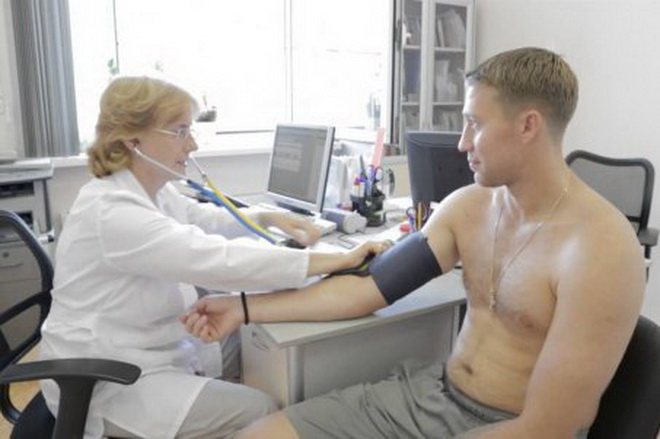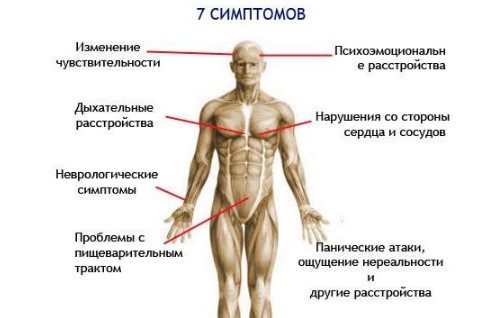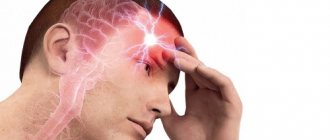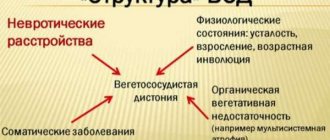Military medical commission
The decisive factors at the military medical commission (hereinafter referred to as the MMC) when deciding on the unfitness of a conscript are the opinions of a neurologist, psychiatrist, and therapist. In Russia, young people with VSD are most often subject to military service. It is believed that this is not an independent diagnosis, but only a set of symptoms and signs that do not pathologically burden life and do not lead to surgery or disability.
However, some manifestations of this disease are difficult to combine with military service, so some young men are subject to commission. Such pathological factors are:
- Chest pain.
- Loss of orientation.
- Hearing loss.
- Loss of visual acuity.
- Fainting.
- Panic attacks.
Many conscripts also need to know whether they are recruited into the army with VSD of the hypertensive type. Such a diagnosis provides the young man with medical advice in almost all cases. It is important to take into account that systolic pressure should not be lower than 145-155 mm Hg. Art., and diastolic - 90-100 mm Hg. Art.
If a young man is diagnosed with VSD of the hypotonic type, he is subject to military service.
If the question arises whether people with mixed airborne forces are recruited into the army, experts also answer positively in most cases.
Possible dangers of VSD when serving in the army
Despite the presence of quite dangerous symptoms, many people with this diagnosis are considered fit for military service. Even mild forms of vegetative-vascular dystonia can provoke dangerous consequences. These include:
- obstruction of small vessels and capillaries;
- hearing loss;
- decreased visual acuity;
- progression of cardiac pathologies;
- the appearance of disorientation in space;
- loss of strength, which can transform into hypoglycemia;
- constant fainting;
- abnormalities in brain function;
- chronic damage to internal organs.
Important: A conscript should be considered unfit for military service if he has arterial hypertension. In this case, the pressure readings must be at least 140/90 mmHg. Art.
If a conscript suffers from panic attacks, he poses a threat not only to his fellow soldiers, but also to the civilian population. At the moment of an attack, such a person loses self-control and cannot be responsible for his actions. Therefore, diagnosis of the disease must be carried out very carefully.
Procedure in case of conscription
If after the first 2-3 months of service the symptoms continue to bother or intensify, then the conscript must receive a referral to the medical unit for hospitalization.
How should a conscript soldier with VSD behave:
- Notify doctors at the place of duty about the presence of the syndrome.
- If your health worsens, you must submit a report to the commander (company, battalion, unit).
- Do not try to cope with panic attacks, insomnia, long periods of low mood, or headaches on your own.
Military personnel are subject to commission if they experience breathing problems, a persistent increase in blood pressure, the appearance of bradycardia, migraines, or fainting.
When passing the commission, the conscript must have in hand medical documents that record all severe episodes of VSD over the past 6 months. If there are no such documents, he will most likely be considered fit for combat.
VSD of the cardiac type: is there a sentence or a way out?
The cardiac type of VSD occurs in approximately 50% of all patients with this disease. This disease is characterized by disorders of the autonomic nervous system, which are accompanied by problems in the functioning of the heart. The disease is accompanied by frequent pain and erratic rhythm of the heart muscle, and general malaise.
Who is at risk
Vegetative-vascular dystonia of the cardiac type affects people of any age, regardless of gender and lifestyle. The first signs of the disease can appear even in children older than 6-7 years. At the same time, there are a number of patterns that define the risk group:
- various heart diseases;
- neurological disorders;
- disturbances in the functioning of the endocrine system.
Thus, people suffering from the diseases listed above most often experience VSD of the cardiac type. In addition, patients often include women who are menopausal, during puberty or pregnancy, as well as those who are constantly exposed to stress.
Symptoms of cardiac VSD
Symptoms of the disease can appear individually or all at once. The reasons for concern should be, first of all:
- acute aching or pressing pain, unpleasant burning sensation in the chest area;
- general weakness, chills;
- constant or recurrent headaches;
- dizziness, neuroses;
- heart rhythm disturbances.
IMPORTANT! . The latter symptom can manifest itself in the form of tachycardia (rapid heartbeat), bradycardia (slow heartbeat) and a general disturbance in the frequency of contractions of the heart muscle.
Causes
- Heredity;
- Pathologies in the perinatal period, including heart failure;
- Smoking and alcohol abuse;
- Multiple chronic infections;
- Hormonal imbalances;
- Allergy or tendency to it;
- Improper development of the body or other abnormalities.
Treatment of cardiac VSD
Typically, therapy involves minimizing the risk to the patient’s health and life. Most often, to suppress the symptoms of the disease, they use:
- Sedatives, such as motherwort tincture or valerian extract.
- Tranquilizers that improve the condition of the central nervous system: Relanium and others.
- Nootropics that have a positive effect on the functioning of the brain. In particular, piracetam can be used.
- Cholinomimetics that stabilize heart function.
In addition, doctors often prescribe antidepressants, cerebroprotectors and other drugs depending on the symptoms. In addition to drug therapy, doctors often recommend that patients attend several massage sessions and Charcot showers, take a course of electrophoresis and acupuncture, engage in physical therapy and perform special breathing exercises.
REFERENCE! In the treatment of VSD of the cardiac type, walks in the fresh air, rest, daytime sleep, and a diet including mineral waters also play an important role.
Prevention of cardiac VSD
For prevention, you need to actively fight bad habits, in particular, reduce the consumption of alcoholic beverages as much as possible. It is important to organize your working day correctly, providing enough time for rest, and taking a lot of walks in nature.
ATTENTION . It is recommended to increase physical activity and strengthen the immune system by consuming vitamins and minerals.
Cardiac VSD and pregnancy: is there a relationship?
Pregnant women are more susceptible to this disease than others for a number of reasons:
- hormonal changes;
- insomnia resulting from general weakness and stress;
- non-compliance with sleep and wakefulness;
- physical inactivity.
VSD and military service
In most cases, the illness is not the reason for removal from military service. Many military doctors do not consider this diagnosis as one that interferes with service.
Exceptions may include symptoms such as persistent acute pain in the heart, panic attacks, and impaired coordination and vision. In order for specialists to make a decision about unsuitability for military service, you need to pass a commission and pass all the necessary tests.
They must confirm that excessive stress on the body will be dangerous for the young man.
VSD of the cardiac type leads to a significant deterioration in the quality of life and the development of various concomitant diseases. In addition, it can cause disability and even shorten life expectancy. It is important to identify the disease in time and begin proper treatment.
VSD of the cardiac type: is there a sentence or a way out? Link to main publication
Source: https://onevrologii.ru/vegetososudistaya-distoniya/vsd-po-kardialnomu-tipu-prigovor-ili-vyhod-est
In what case is a conscript with VSD “unfit”?
It is necessary to undergo all examinations for VSD in advance.
In severe cases, the following signs appear:
- obstruction of small vessels and capillaries,
- headache,
- pathologies in the heart,
- panic attacks,
- other symptoms.
Suitability categories for panic attacks
the following. “Unfit”, that is, with category “D”, can be recognized if you have undergone repeated treatment in the hospital and it did not bring results. Also if there were disorders at least once a month.
It will not be possible to slope by simulating VSD. Many doctors consider VSD to be a manifestation of other diseases, for example, hypertension, heart disease, diseases of the nervous system, and so on.
So, people with panic attacks are recruited into the army.
. There are not many exceptions.
If you have any doubts about whether you can count on exemption from the army or service without restrictions due to your health condition, it is better to consult with an experienced military lawyer who will help you understand the nuances and develop the right course of action.
Since this site is dedicated to the fight against panic attacks, and how to deal with them, we will also now try to understand the phenomenon of panic attacks in men, and with such a state of affairs as panic attacks and the army.
What to do if you are drafted into the army?
If the medical commission did not consider the presence of this pathology to be a sufficient reason for exemption from military service, it is important to familiarize yourself with the main rules that will help prevent a violation of the person’s condition.
During military service, attention will be paid to the presence of vegetative-vascular dystonia only if there is a serious deterioration in the person’s health, which will interfere with the full performance of his duties.
Therefore, upon arrival at the unit, the patient must immediately go to the medical center and give the doctor a copy of the medical record. Thanks to this, the specialist will learn about the presence of a soldier diagnosed with VSD and will periodically monitor his health status. If necessary, such a soldier will be provided with first aid and appropriate treatment will be selected.
If vegetative-vascular dystonia recurs during military service and serious signs of the disease appear, you must immediately contact the medical unit.
It is strictly forbidden to try to cope with panic attacks on your own. This phenomenon can worsen and lead to regular sleep disturbances, depression and psycho-emotional disorders. It is also worth considering that psychological problems can cause the development of neuroses and asthenia.
Therefore, experts note that with every noticeable change in well-being, people with such a diagnosis should immediately consult a doctor.
What do military doctors say?
Passing a medical examination at the military registration and enlistment office is a mandatory step in order to receive a deferment or a “white ticket.” During the examination, a psychiatrist and a neurologist will talk to the conscript. It is necessary to immediately report VSD and provide confirmation of the diagnosis in the form of extracts from the medical history or a certificate from the attending physician. If they are not there, then the conscript will be declared fit for service.

Another important point is the presence of problems with the cardiovascular and uneven system. Conscripts who provide their official confirmation receive a conclusion that their VSD is mild, but they still remain fit for service. Doctors make such conclusions based on a biased attitude towards neurocircular disorders in general.
It is still believed that normalization of the work and rest regime, together with proper nutrition, leads to the strengthening of the body and the elimination of symptoms of VSD. This is partly true when it comes to minor disorders. But if a person suffers from severe panic attacks or unbearable headaches, military service will only worsen these symptoms.
Diagnostic rules
When passing a military commission, it is very important to draw the attention of doctors to the presence of symptoms of pathology. As already mentioned, VSD is not a reason for exemption from military service. However, people with persistent pressure changes, psychological disorders or abnormalities in the functioning of the heart may be excluded.
To do this, during the initial examination it is necessary to draw the attention of specialists to the following symptoms:
- frequent occurrence of weakness;
- breathing problems;
- heart sinking;
- migraine;
- deviation of blood pressure readings from the norm;
- fainting conditions;
- chronic fatigue;
- tachycardia;
- dizziness accompanied by nausea;
- panic attacks.

It is panic attacks that can be considered one of the most significant factors that makes a conscript unfit for service. The fact is that it is simply dangerous for people with such a nervous system disorder to be trusted with weapons.
IT IS IMPORTANT TO KNOW! Elevated cholesterol levels provoke the development of hypertension and atherosclerosis, and in general are very dangerous for the heart. But today this problem has already been solved in Israel. In this country, scientists have found a way to dissolve cholesterol plaques with natural ingredients. The product is used at home with water. Read more.
A panic attack is understood as a sudden attack of unreasonable fear, which is characterized by a persistent desire to hide and run away. We can say that the person is literally going crazy at this moment.
Of course, such a violation is grounds for exemption from military service. However, proving the presence of this diagnosis during a medical examination is very problematic.
Important: If such a violation is present, you must prepare evidence in advance. To do this, if symptoms of panic attacks appear, you should definitely consult a doctor. Thanks to this, the necessary information will be reflected in the patient’s medical record.
In addition, when diagnosing vegetative-vascular dystonia, it is worth remembering that in order to declare a conscript unfit for military service, the disease must be accompanied by the following manifestations:
- strong fluctuations in blood pressure;
- symptoms of tachycardia;
- frequent headaches of high intensity;
- anemia;
- chronic insomnia, which is accompanied by severe weakness and fainting;
- problems with coordination of movements.
Official confirmation of the presence of autonomic dysfunction will be made by the attending physician. Typically, the pathology is diagnosed in the case of the paroxysmal nature of these symptoms. The disadvantage of such a diagnosis is the restrictions that are imposed on the man’s subsequent career.
Subsequently, the person will not be able to work in the police and engage in activities that require increased concentration. Also, people with this diagnosis are prohibited from working in high-risk conditions.
Please note: Young men who experience fainting at least once a month, and this data is recorded in the medical record, are considered unfit for military service.







